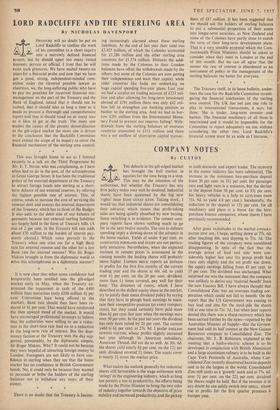COMPANY NOTES
By CUSTOS
THE debacle in the gilt-edged market has brought the bull market in
• • equities for the time being to a stop.
s may be the intention of the
authorities, but whether the Treasury has any firm policy today may well be doubted. Industrial shares have been quietened by the big new `rights' issue from GUEST KEEN. Taking stock, I would say that industrial shares are consolidating their advance, which means that profit-taking sales are being quietly absorbed by new buying. Some switching is in evidence. The cement com- pany reports have shown nothing much to go for in the next twelve months. The cuts in defence spending imply a slowing-down of the advance in the home market. Yields of under 4 per cent. on ASSOCIATED PORTLAND and RUGBY are not particu- larly attractive. Nevertheless, when the expected increase in cement prices is announced in the coming months the leading shares will probably move higher. LONDON BRICK reports an increase in profits for the first five months of the current trading year and the shares at 60s. 6d. to yield over 64 per cent. on the 20 per cent. dividend, more than 14 times covered, pay well for their keep. The directors of COATS, which I have described as the dullest equity share in the market, try to justify their mean dividend policy by saying that they have to plough back earnings to main- tain their competitive position (as every company must), but they could certainly have paid more than 84 per cent. last year when the earnings were over 30 per cent. In the past ten years the dividend has only been raised by 24 per cent. The current yield is 64 per cent. at 27s. 9d. I prefer ENGLISH SEWING COTTON, whose profits slightly increased last year although Its American subsidiary, American Thread, did not do so well. At 30s. 6d. the shares yield nearly 84 per cent. on the 124 per cent. dividend covered 24 times. The assets cover is nearly 24 times the market price.
* * * What makes the outlook generally for industrial shares still favourable is the wage settlement with `strings' in the engineering industry, which at long last permits a rise in productivity, the efforts being made by the Prime Minister to bring the two sides of industry together towards the objective of price stability and increased productivity, and the pickup
in both domestic and export trades. The recovery in the motor industry has been substantial. The increase in the minimum hire-purchase deposit from 20 per cent. to 334 per cent. for passenger cars and light vans is a nuisance, but the decline in the deposit from 50 per cent. to 334 per cent, for heavy vehicles is a help to LEYLANDS (now 51s. 9d. to yield 4.8 per cent.). Incidentally, the reduction in the deposit to 33-} per cent. for all machinery and plant is a boost for the hire- purchase finance companies, whose shares I have previously recommended.
* * *
After great vicissitudes in the market CONSOLI- DATED ZINC are, I hope, settling down at 77s. 6d. after touching 80s. and dipping to 71s. 3d. The trading figures of the company were considered disappointing. In spite of the fact that the average prices of lead and zinc were con- siderably higher last year the group profit had risen only slightly and the net profit was down, the equity earnings falling from 43 per cent. to 37 per cent. The dividend was unchanged. What surprised me was the statement that the company was unlikely to derive any `material benefit' from the new Finance Bill. I have always thought that Consolidated Zinc was an overseas trading cor- poration which could not fail to benefit. On the report that the US Government was ceasing to buy lead and zinc for the stock-pile the shares fell at one time to 71s. 3d., but when later reports denied this there was a sharp recovery which has been carried further by the news—reported by the Australian Minister of Supply—that the Govern- ment had sold its half interest in the New Guinea Resources company to Consolidated Zinc. The chairman, Mr. L. B. Robinson, explained at the meeting that a hydro-electric scheme is to be developed in conjunction with British Aluminium and a large aluminium refinery is to be built in the Cape York Peninsula of Australia, where Con- solidated Zinc recently discovered bauxite deposits said to be the largest in the world. Consolidated Zinc still ranks as a `growth' stock and at 77s. 6d. over 54 per cent. on the 224 per cent. dividend the shares might be held. But if the investor is in any doubt he can safely switch into SHELL, whose rise in profits for the first quarter promises a bumper year.


































 Previous page
Previous page